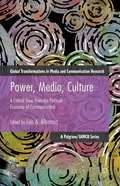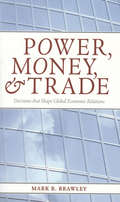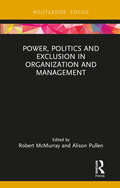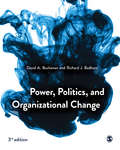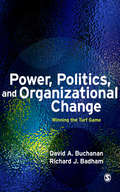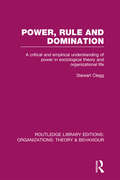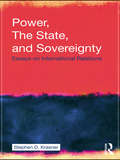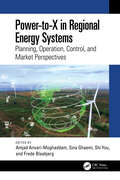- Table View
- List View
Power, Interdependence, and Nonstate Actors in World Politics
by Helen V. Milner Andrew MoravcsikSince they were pioneered in the 1970s by Robert Keohane and others, the broad range of neoliberal institutionalist theories of international relations have grown in importance. In an increasingly globalized world, the realist and neorealist focus on states, military power, conflict, and anarchy has more and more given way to a recognition of the importance of nonstate actors, nonmilitary forms of power, interdependence, international institutions, and cooperation. Drawing together a group of leading international relations theorists, this book explores the frontiers of new research on the role of such forces in world politics. The topics explored in these chapters include the uneven role of peacekeepers in civil wars, the success of human rights treaties in promoting women's rights, the disproportionate power of developing countries in international environmental policy negotiations, and the prospects for Asian regional cooperation. While all of the chapters demonstrate the empirical and theoretical vitality of liberal and institutionalist theories, they also highlight weaknesses that should drive future research and influence the reform of foreign policy and international organizations. In addition to the editors, the contributors are Vinod Aggarawal, Jonathan Aronson, Elizabeth DeSombre, Page Fortna, Michael Gilligan, Lisa Martin, Timothy McKeown, Ronald Mitchell, Layna Mosley, Beth Simmons, Randall Stone, and Ann Tickner.
Power, Media, Culture
by Luis A. AlbornozThis book updates and revalidates critical political economy of communication approaches. It is destined to become a work of reference for those interested in delving into debates arising from the performance of traditional and new media, cultural and communication policy-making or sociocultural practices in the new digital landscape.
Power, Money, and Trade: Decisions That Shape Global Economic Relations
by Mark R. BrawleyThis book is an introduction to International Relations that uses examples from International Political Economy (IPE). It presents the theories and paradigms of International Relations in the context of the issues of trade, investment, and monetary relations. Largely it does so by developing historical cases of pivotal events in the evolution of the IPE to illustrate the strengths and weaknesses of these theories. This focus on the substantive material of the IPE allows a shift beyond traditional debates to include newer paradigms such as Constructivism and Institutionalism. The result is a book that not only reveals and explains prominent arguments and debates, but also provides grounding in the history and structure of the IPE. The first half of the book explains the main features of the IPE. It develops and illustrates the ways in which political scientists elaborate and employ theories of International Relations by classifying and examining the main levels of analysis from characteristics of the international system, through those of nation states, to explanations of policy effected by officials. The second half examines important historical cases chosen both to illustrate theories and also to chart the overall patterns of change. Readers are thereby introduced to important theories and issues in International Relations and to key historical episodes from the late nineteenth century to the recent East Asian financial crisis. Special attention is paid to critical decisions in the development of American and Canadian foreign policies
Power, Persuasion, and Politics in the Higher Education Workplace: A Guide for Faculty and Staff
by Felecia Commodore George S. McClellan Dena KniessThis invaluable resource supplies foundational knowledge and expert strategies on navigating the workplace dynamics of power, persuasion, and politics across higher education.Despite burnout, compassion fatigue, and questions of privilege and oppression being at the forefront of academia, little if any attention is given to the political aspects of professional practice across the array of campus administrative and academic units. By masterfully leveraging scholarly literature on power, persuasion, and politics with the tried-and-true collegiate expertise of the contributing authors, faculty and staff will develop the knowledge and skills they need to negotiate the pervasive, often intimidating political behavior that dominates the higher education workspace.The ultimate guide to understanding, engaging, and thriving in the campus workplace, this book belongs in the hands of all higher education professionals.
Power, Pleasure, and Profit: Insatiable Appetities from Machiavelli to Madison
by David WoottonDavid Wootton guides us through four centuries of Western thought to show how new ideas about politics, ethics, and economics stepped into a gap opened up by religious conflict and the Scientific Revolution. As ideas about godliness and Aristotelian virtue faded, theories about the rational pursuit of power, pleasure, and profit moved to the fore.
Power, Politics and Exclusion in Organization and Management (Routledge Focus on Women Writers in Organization Studies)
by Alison Pullen Robert McMurrayThere is a long tradition of research on politics, power and exclusion in areas such as sociology, social policy, politics, women’s studies and philosophy. While power has received considerable attention in mainstream management research and teaching, it is rarely considered in terms of politics and exclusion, particularly where the work of women writers is concerned. This second book in the Routledge Series on Women Writers in Organization Studies analyses the ways in which women have theorised and embodied relations of power. Women like Edith Garrud who, trained in the Japanese art of jujutsu, confronted the power of the state to champion feminist politics. Others, such as Beatrice Webb and Alva Myrdal, are shown to have been at the heart of welfare reforms and social justice movements that responded to the worst excesses of industrialisation based on considerations of class and gender. The writing of bell hooks provides a necessarily uncomfortable account of the ways in which imperialism, white supremacy and patriarchy inflict unspoken harm, while Hannah Arendt’s work considers the ways in which different modes of organizing restrict the ability of people to live freely. Taken together, such writings dispel the myth that work or business can be separated from the rest of life, a point driven home by Rosabeth Moss Kanter’s observations on the ways in which power and inequality differentially structure life chances. These writers challenge us to think again about power, politics and exclusion in organizational contexts. They provide provocative thinking, which opens up new avenues for organization theory, practice and social activism. Each woman writer is introduced and analysed by experts in organization studies. Further reading and accessible resources are also identified for those interested in knowing (thinking!) more. This book will be relevant to students, researchers and practitioners with an interest in business and management, organizational studies, critical management studies, gender studies and sociology. Like all the books in this series, it will also be interest to anyone who wants to see, think and act differently.
Power, Politics and Influence: Exercising Followership, Leadership, and Practicing Politics (Springer Studies on Populism, Identity Politics and Social Justice)
by Adebowale AkandeThis book comprehensively explores the foundational principles of power, influence, and organizational politics, presenting actionable approaches for both employees and management to skillfully navigate these intricacies without succumbing to undue incivility, stress, or burnout. Power, as an imperceptible yet influential entity within organizations, steers the trajectory of decisions, behaviors, and the dynamic interplay between leaders and their teams. This book examines leadership theory and practice, offering a unique perspective on leadership styles, behaviors, and traits. In today's dynamic landscape, leadership capability and skill are important across sectors, influencing organizational health, political landscapes, and societal development. The book presents the challenges modern leaders face and how leadership theory can enrich workplace dynamics and beyond. Bridging the gap between academic research and practice, this volume offers guidance for aspiring and experienced leaders alike. From political skill to organizational culture, this book examines leadership from a multidisciplinary perspective. Scholars, students, and researchers of political science, business, management, economics, international relations, and psychology, as well as consultants, policymakers, and leaders interested in a better understanding of effective leadership concepts and the latest research in politics, policy, and participation in any setting, will find this resource invaluable.
Power, Politics and International Events.: Socio-cultural Analyses of Festivals and Spectacles (Routledge Advances in Event Research Series)
by Udo MerkelAlthough the event management field has grown considerably over the last decade, critical, social-scientific studies of the international events industry are rare. This book intends to help fill this void. It focuses on power, social and political relations, conflicts and controversies in the context of international events, popular festivals and famous spectacles. It draws on recent primary research and offers a diverse range of new and intriguing case studies, for example the Arirang Festival in North Korea, the Gay Games, the Gymnaestrada, horse-racing events, the London 2012 Olympics, regional and rural festivals, the World Baseball Classic, World Fairs/Expos and U2 concerts. The main aim of this volume is to bring the critical, social-scientific analysis of events, festivals and spectacles more into the core of the teaching of events management degree programmes. The book draws extensively upon the disciplines of politics, sociology, cultural studies and history.In the process, it addresses key themes such as: • political economy• politics of popular culture• the global and the local• regionalism and globalization• nations and nationalism• international relations and foreign policy. This groundbreaking collection of essays is unique and innovative. It will be an essential source for students, researchers and academics with a keen interest in critical, social-scientific analyses of events.
Power, Politics, and Organizational Change
by Richard Badham Professor David BuchananOrganization politics can be seen as a game in which players compete for different kinds of territory such as status, power, and influence. In Power, Politics and Organizational Change, David Buchanan and Richard Badham ask: What&’s the relevance of politics to change and innovation? What kind of game is this? What, if any, are the rules? How is the game played? What ethical issues arise? Should one play this game to win, and if so, how? How can you develop political expertise? The third edition has been thoroughly updated and revised. This includes discussion of current trends heightening the importance of developing political will and skill in a post-truth era, the rise of &‘new power&’, the role of &‘BS busting&’, the power of storytelling, and the politics of speaking up.
Power, Politics, and Organizational Change
by Richard Badham Professor David BuchananOrganization politics can be seen as a game in which players compete for different kinds of territory such as status, power, and influence. In Power, Politics and Organizational Change, David Buchanan and Richard Badham ask: What&’s the relevance of politics to change and innovation? What kind of game is this? What, if any, are the rules? How is the game played? What ethical issues arise? Should one play this game to win, and if so, how? How can you develop political expertise? The third edition has been thoroughly updated and revised. This includes discussion of current trends heightening the importance of developing political will and skill in a post-truth era, the rise of &‘new power&’, the role of &‘BS busting&’, the power of storytelling, and the politics of speaking up.
Power, Politics, and Organizational Change (Second Edition): Winning the Turf Game
by David Buchanan Richard Badham`Many books on management are sanitized, cleanly technical accounts of the unreality of managerial life and work. Politics hardly feature. This book tells it like it is: it dishes the dirt, gets low-down, into the funky and fascinating politics of organizational life' - Stewart Clegg, Aston Business School and University of Technology, Sydney Combining a practical and theoretical guide to the politics of organizational change, this book provides an exceptional resource to students of change management, and organizational behaviour. Buchanan and Badham show how the change agent who is not politically skilled will fail, and that it is necessary to be able and willing to intervene in the political processes of the organization. This revised edition includes a range of excellent new material and features, including: - a new chapter on gender in approaches to organization politics - a full range of teaching materials including case studies, incident reports, self-assessments, and more - Each chapter recommends a feature film (or DVD) to illustrate aspects of organization politics - fresh research evidence - recent literature on the nature of entrepreneurial politics; - a model of political expertise, and how that can be developed This lively and engaging book is key to MBA and other Masters degree candidates taking courses in change management, and organizational behaviour. It will also be valuable for practising managers on tailored executive programmes in organization politics.
Power, Politics, and Paranoia
by Jan-Willem van Prooijen Paul A. M. van LangePowerful societal leaders - such as politicians and Chief Executives - are frequently met with substantial distrust by the public. But why are people so suspicious of their leaders? One possibility is that 'power corrupts', and therefore people are right in their reservations. Indeed, there are numerous examples of unethical leadership, even at the highest level, as the Watergate and Enron scandals clearly illustrate. Another possibility is that people are unjustifiably paranoid, as underscored by some of the rather far-fetched conspiracy theories that are endorsed by a surprisingly large portion of citizens. Are societal power holders more likely than the average citizen to display unethical behaviour? How do people generally think and feel about politicians? How do paranoia and conspiracy beliefs about societal power holders originate? In this book, prominent scholars address these intriguing questions and illuminate the many facets of the relations between power, politics and paranoia.
Power, Procedure, Participation and Legitimacy in Global Sustainability Norms: A Theory of Collaborative Regulation (Globalization: Law and Policy)
by Karin BuhmannGlobalisation of the market, law and politics contributes to a diversity of transnational sustainability problems whose solutions exceed the territorial jurisdictional limits of nation states in which their effects are generated or occur. The rise of the business sector as a powerful global actor with a claim to participation and potential contributions as well as adverse impacts sustainability complicates the regulatory challenge. Recent decades’ efforts to govern transitions towards sustainability through public or hybrid regulation display mixed records of support and results. In combination, these issues highlight the need for insights on what conditions multi-stakeholder regulation for a process that balances stakeholder power and delivers results perceived as legitimate by participants and broader society. This book responds to that need. Based on empirical experience on public-private regulation of global sustainability concerns and theoretical perspectives on transnational regulation, the book proposes a new theory on collaborative regulation. This theory sets out a procedural approach for multi-stakeholder regulation of global sustainability issues in a global legal and political order to provide for legitimacy of process and results. It takes account of the claims to participation of the private sector as well as civil society organisations and the need to balance power disparities.
Power, Property Rights, and Economic Development: The Case of Bangladesh
by Yasushi Suzuki Mohammad Dulal MiahThis book presents a critical reassessment of theories of property rights, in response to conflicts and competition between different groups, and the state. It does so by taking an institutional political perspective to analyse the structures of property rights, with a focus on a series of case studies from Bangladesh. In doing so, the book highlights the importance of property rights for economic growth, why developing countries often fail to design property rights conducive for economic development, and the strategies required for designing an efficient structure of rights. Since property rights falls within the domain of Law and Economics, the book ventures to explain legal issues from an economic perspective, resulting in empirical analysis that comprises both legal and non-legal cases.
Power, Protection, and Free Trade: International Sources of U.S. Commercial Strategy, 1887–1939 (Cornell Studies in Political Economy)
by David A. LakeWhy do nations so frequently abandon unrestricted international commerce in favor of trade protectionism? David A. Lake contends that the dominant explanation, interest group theory, does not adequately explain American trade strategy or address the contradictory elements of cooperation and conflict that shape the international economy. Power, Protection, and Free Trade offers an alternative, systemic approach to trade strategy that builds on the interaction between domestic and international factors. In this innovative book, Lake maintains that both protection and free trade are legitimate and effective instruments of national policy, the considered responses of nations to varying international structures.
Power, Rule and Domination: A Critical and Empirical Understanding of Power in Sociological Theory and Organizational Life (Routledge Library Editions: Organizations)
by Stewart CleggThis volume presents a critical analysis of sociological theorizing and power which enables the reader to grasp fully the nature of power, rule and domination in organizational life. By making use of the discussions he recorded at a construction site, the author brings the reader into contact with the everyday social world in which he locates his analysis of power and authority at both a structural and phenomenological level. This analysis is complemented by the author’s review of the literature on ‘theorizing’ by writers such as Wittgenstein, Blum, McHugh, Phillips and Cicourel; his examination of the ‘community power debate’ between authors such as Bachrach and Baratz and Dahl; and a survey of the literature on power in its organizational aspects by Weber, Simmel and the more contemporary work of Hickson.
Power, Sexuality and Gender Dynamics at Work
by Roop Sen Uma ChatterjeePower, Sexuality and Gender Dynamics at Work explores the friction between people with different gender and sexual identities in corporate organizations. While organizations genuinely want to promote gender balance and remove biases against sexual minorities, the experiences, struggles and doubts therein have remained undisclosed. Moreover, D&I and POSH initiatives driving this agenda through political correctness are restrictive. In this book, Roop and Uma use organizational lived experiences to analyse interpersonal conflicts, dilemmas and dynamics that manifest in accusations and grief, often leaving leaders and managers perplexed. Read along as they grapple with a complex phenomenon and advocate tapping the potential of creativity, compassion and trust between different genders, identities and orientations.
Power, Voting, and Voting Power: 30 Years After
by Hannu Nurmi Manfred J HollerThe developments over a thirty-year time span in the study of power, especially voting power, are traced in this book, which provides an up-to-date overview of applications of n-person game theory to the study of power in multimember bodies. Other theories that shed light on power distribution (e.g. aggregation theory) are treated as well. The book revisits the themes discussed in the well-known 1982 publication "Power, Voting and Voting Power" (edited by Manfred J. Holler). Thirty years later this essential topic has been taken up again and many of the authors from its predecessor participate here again in discussing the state-of-the-art, demonstrating the achievements of three decades of intensive research, and pointing the way to key issues for future work.
Power, for All: How It Really Works and Why It's Everyone's Business
by Tiziana Casciaro Julie Battilana&“A remarkably insightful read on what power is, how it&’s gained and lost, and how it can be used for good. The masterful analysis by two leading experts will make you rethink some of your most basic assumptions about influence&” (Adam Grant, #1 New York Times bestselling author of Think Again).Power is one of the most misunderstood—and therefore vilified—concepts in our society. Most people assume power is predetermined by personality or wealth, or that it&’s gained by strong-arming others. Many write it off as inherently corrupt or &“dirty&” and want nothing to do with it. But as pioneering researchers Julie Battilana and Tiziana Casciaro deftly show in Power, for All, power is the ability to influence someone else&’s behavior. This influence is derived from having access to valued resources, which anyone can have, regardless of their income or status in life. Everyone has a resource to offer, so everyone has access to power. Battilana and Casciaro offer a timely, democratized vision of power. While hierarchies tend to stay in place because power is often sticky, by agitating, innovating, and orchestrating change, they show how those with less power can challenge established structures to make them more balanced. They teach readers how to power-map their workplace to find who can create real change at work, plan for and cause sustaining power shifts, and understand the five motivations for seeking power—money and status, but also autonomy, achievement, affiliation, and morality. They explore how these dynamics play out through vivid storytelling: as Donatella Versace successfully leads her brother&’s company after his death—despite having a title, but little influence; what social movements can learn from youth climate activists and how they can go farther; and how a manager can gain the trust of skeptical employees and improve the workplace. Ultimately, Power, for All demystifies the essential mechanisms for acquiring and using power for all people. Concentrated, accessible, and life-changing, Power, for All is the definitive guide to understanding and navigating power in our relationships, organizations, and society.
Power, the State, and Sovereignty: Essays on International Relations
by Stephen D. KrasnerStephen Krasner has been one of the most influential theorists within international relations and international political economy over the past few decades. Power, the State, and Sovereignty is a collection of his key scholarly works. The book includes both a framing introduction written for this volume, and a concluding essay examining the relationship between academic research and the actual making of foreign policy. Drawing on both his extensive academic work and his experiences during his recent role within the Bush administration (as Director for Policy Planning at the US State department) Krasner has revised and updated all of the essays in the collection to provide a coherent discussion of the importance of power, ideas, and domestic structures in world politics. Progressing through a carefully structured evaluation of US domestic politics and foreign policy, international politics and finally sovereignty, this volume is essential reading for all serious scholars of international politics.
Power-to-X in Regional Energy Systems: Planning, Operation, Control, and Market Perspectives
by Frede Blaabjerg Amjad Anvari-Moghaddam Shi You Sina GhaemiPower-to-X in Regional Energy Systems discusses the role of these technologies in achieving a carbon-neutral economy and the impact on the energy markets, with implications for electricity, gas, hydrogen, and ancillary services. It focuses on the challenges and benefits of implementing PtX technologies in regional-scale applications.Emphasizing the role of PtX technologies as enablers of sector coupling, the book provides a comprehensive understanding of how these technologies integrate and interact with the industry, transportation, and residential sectors. It describes the significance of PtX, optimal planning, and cost-effective operation of PtX technologies across different sectors and the impact of PtX devices on energy markets. The book considers investing in PtX technologies and contributing to the transition to a sustainable economy.The book will interest professionals and policymakers working in various energy sectors. Researchers and academics in electrical engineering, power systems, renewable energy, and energy economics will also find the content useful.
Power: A Key Idea for Business and Society (Key Ideas in Business and Management)
by Reinoud BoschPower plays a central role in business and management. But what is power exactly, and what are key elements of this concept? Defining power as relative ability, this book discusses structures of power, individual power, the exercise of power, strategy, and collective power. While discussing these key components, ideas of important thinkers about power, from Plato to Foucault, Weber to Lukes, Machiavelli to Kahneman, Sun to Kotter, and Barnard to Clegg, are discussed and interpretively categorized into a toolbox of conceptual elements – what Blumer referred to as sensitizing concepts. This toolbox of sensitizing concepts allows the selection of those elements of the concept of power that provide the most constructive and effective practical understanding in particular situations. The core message behind the discussion is that knowledge of key components of the concept of power is empowering. It is empowering to learn about aspects of structures of power, individual power, the exercise of power, strategy, and collective power. Understanding such conceptual components empowers students, researchers, practitioners, and other readers to use their understanding in interpreting, theorizing about, and dealing with the complexities of power in their particular situations – without tying them to any preconceived general theories about power.
Power: A User's Guide
by Julie DiamondUsing power well is more than a matter of good intentions. The path toward ethical, authentic, and effective use of power starts with this book. Combining cutting-edge psychological theory with practical exercises, real-world accounts of leadership challenges, and the author's personal stories from her career as a facilitator and coach, it aims to develop the reader's external authority to navigate high-power roles and responsibilities, and to find personal power within.
Power: A Woman's Guide to Living and Leading Without Apology
by Kemi Nekvapil"This book is a miraculous event." –Elizabeth Gilbert, from the forewordA transformative path for women to reclaim their power in a world all too eager to strip it awayWomen know what it&’s like to feel powerless. We have had power taken from us and used over us, and sometimes we have had to give it away for our own safety. But when power is built internally, it is stronger and more enduring than that bestowed externally. In Power, renowned leadership coach Kemi Nekvapil introduces a new framework for cultivating your power from the inside out.When you tap into the power that comes from within, you have the capacity to rebuild yourself. You give yourself the opportunity to break free from chronic people-pleasing and start making choices that align with your needs and values. You stop living and leading with apology, and instead use your power as a force for good.Through the principles of Presence, Ownership, Wisdom, Equality, and Responsibility, Power invites you to stop waiting for power to be handed to you and instead choose it for yourself and on your own terms. Drawing on stories from her own life as a Black woman in a society where power is often used as a tool for fear and obedience, and from the lives of leaders, gamechangers, and everyday women who&’ve learned to step into their power, Nekvapil shows you how to practice, build, and feel your inner force.
Power: Nobody Should Have Too Much
by Arie De GeusThis chapter illustrates how the ideal system of corporate governance provides continuity, with all the requirements that nurture a living company and a human community, without absolute power concentrated in the hands of either shareholders or management.

